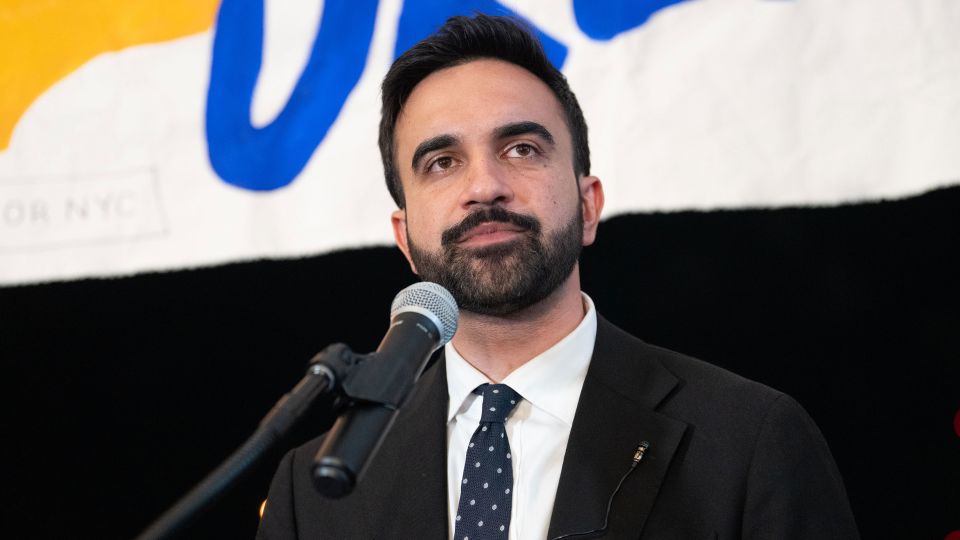(CNN) — Zohran Mamdani told a group of top business leaders in New York City on Tuesday that he would discourage the use of the phrase “globalize the intifada,” according to two people who were in the room during the meeting, marking a notable shift in rhetoric for the Democratic nominee for mayor as the campaign enters the general election.
Gathered alongside approximately 150 prominent business leaders at the offices of Tishman Speyer on Tuesday, Dr. Albert Bourla, chairman and CEO of Pfizer — who is the son of Holocaust survivors — asked Zohran Mamdani, the Democratic nominee for mayor to explain his previous defense of the phrase “globalize the intifada.”
Mamdani, who has not used the phrase himself, has said he believes the phrase to be a rallying cry for Palestinian human rights, and refused to condemn its use when asked during his primary campaign.
But during Tuesday’s meeting, Mamdani also told the packed room he understood why the phrase is also seen as a call to violence against Jews, why it is painful and triggering for them, and that he would discourage its use in the future, the two attendees told CNN.
Bourla, who has publicly spoken about his mother’s Holocaust survival story, read off a set of facts and historical data points describing what Jews suffered during the Holocaust and defended Israel’s military action in Gaza, the attendees added.
The meeting was convened by Partnership for New York, a nonprofit organization that represents some of the city’s largest corporations, law firms and banks.
“(Bourla) challenged him on characterizing Israel activities in Gaza as a genocide,” Kathryn Wylde, CEO of Partnership for New York, told CNN in an interview. “It was tense. I don’t think everyone in the room was satisfied with his answer but he did show that he was empathetic to the concerns of Jewish people.”
CNN has reached out to Bourla and Pfizer.
The topic dominated headlines in the weeks leading up to the primary election last month. Now, as Mamdani campaigns toward the general election, where he will face both incumbent Mayor Eric Adams and former New York Gov. Andrew Cuomo, his adjustment in tone reflects his campaign’s effort to appeal to a broader swath of voters, including Jewish New Yorkers who might be hesitant to support Mamdani in part because of his criticism of Israel.
“Zohran appreciated the meeting yesterday, and felt it was a constructive, honest discussion,” Jeffrey Lerner, a spokesperson for Mamdani, told CNN in a statement. “We look forward to the opportunity to build on this conversation, even in navigating disagreement on fiscal policy. Zohran continues to believe that working in partnership is the best way to deliver an affordable city for all New Yorkers.”
The 90-minute meeting was cordial despite some pointed questions, the two people who were present said. In attendance were leaders from a range of different companies, including the Bank of New York, Macy’s, and Tapestry, a luxury brand company; leaders of private equity firms; and several leaders in real estate, including Rob Speyer of Tishman Speyer and Jeff Blau of Related Companies.
Mamdani is expected to hold a second meeting with the Partnership for New York on Wednesday, this time in front of tech leaders. The conversation will be moderated by AlleyCorp’s founder and CEO Kevin Ryan.
“There are those who have an ideological or religious problem with his stance on capitalism and the larger Jewish question — they walked away more afraid than ever because of how smart he is,” Wylde said. “But there were others that feel there is an air of inevitability, that he is a one-in-a-generation candidate and came across as someone who is open to listening and learning.”
Mamdani’s meeting with business leaders is a standard move for a Democratic nominee. His proposal to raise taxes on the city’s wealthiest inhabitants and freeze the rent for residents living in approximately 1 million rent-stabilized apartments is concerning to many business leaders who believe the city’s tax base will be harmed.
Wylde said it’s not just the threat of big corporations leaving the city, but rather the fear that if the city’s services, quality of life and public safety begin to decline, combined with an increase in taxes, it will become much harder to attract and keep new talent in the city.
“He underestimates the vulnerability of the city,” Wylde said.
For Mamdani, it was an opportunity to introduce himself to an audience unfamiliar with him and overly skeptical of many of his proposals. Wylde said that over all she thought Mamdani struck the right tone by listening and trying to assuage fears in the room.
“The way he responded is by saying that he is listening and will learn and that he is open. If that is true, that is very comforting,” Wylde said.
For more CNN news and newsletters create an account at CNN.com

